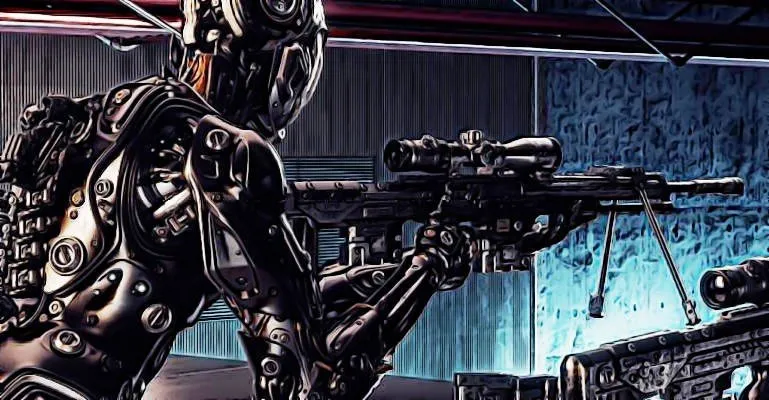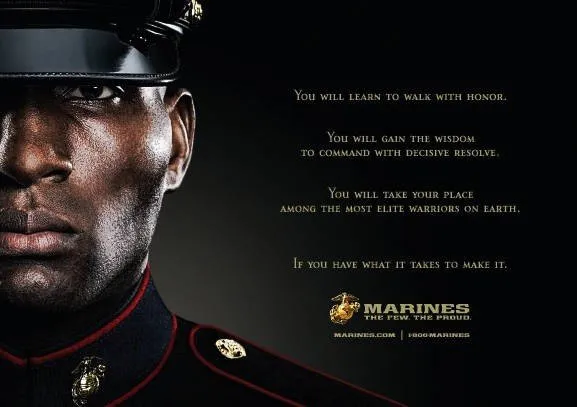Science Fiction Futures and the US Marine Corps
So not only are Sci-Fi writers churning out the newest Sci-Fi stories along with Netflix and Hollywood.
Creating a new Golden Age of Sci-Fi.
Now, according to Wired Magazine, the US Marine Corps is joining the mix.

Image Courtesey IBM-Games
They have started a Science Fiction Futures short story division to pump out Future war time scenarios.
Sci-Fi Marine war-fighting projects.
From a Civil war in Tawain to clearing a High Rise in Manhatten.
It does slightly have a whiff of the movie,
Starship Troopers.
Now don't get me wrong, it is one of my favorite movies. But they could have done better.
"Kill em all," is not exactly the best Earthly diplomatic tactic we can try.
When we reach for the Stars.
But it's the Marines or a Future version of them.
And that's what they get paid to do.
So getting them to read possible future battle scenarios is a good thing. Isn't it?
But as Mike Tyson has said,
"Everybody got a plan until they get hit."
There is a glut of TV shows on at the moment that are glorifying the, Super Smart Kids.
From Scorpion about some Irish Dude who hacked NASA.
To "Touch" again about a super intelligent kid
who saves the day. Everyday;D~
They have become our Geek Jocks.
It's cool to be Super Smart, on TV at least
And in a way the Marines are doing their best, to get to the next level of Uber Geek Marine Jock.
Well, I think they will fail.
As the bottom line is, the last thing they want is a thinking soldier on a bloody battle field.
They want well trained Killer Robots, with frikin lasers attached to their heads.
And that my friend will be the future of the Space Marine Corp.
AI Robot Marines, willing to storm Ceraunius Tholus Hill one more time.
We are trying our best to ban Robot Killers.
At least a group called the
"International Committee for Robot Arms Control (ICRAC)," have come up with this slogan.
"Machines should not be allowed to make the decision to kill people."
I can think of another one.
"Guns don't kill people, Machines do."
It's going to happen, its already happened.
Drones have been doing it in the Afghan for years.
I'm glad the Marines are looking at Sci-Fi for some vision of the future.
Arthur C Clarke once said, "Politicians should read science fiction, not westerns and detective stories."
And to that we can now add the US Marine Corps.

Image Courtesy of US Marine Corps
LANCE CPL. STEVEN West steps into a remote enemy hideout clad in a 350-pound exoskeleton, sensors piercing the darkness and displaying digital info on his helmet visor, until a shock of static feedback knocks him to the dirty floor. A band of locals surround him with pipes and rebar. “The feedback stopped, leaving his ears ringing, and grainy video feed warped back into view as he was struck again. And again.”
This scene isn’t pulled from the latest Clancy-esque techno-thriller, but a short story written as part of a new Marine Corps exercise using science fiction to think about possible threats 15 to 30 years in the future.
“Water’s a Fightin’ Word” recounts what happens when a squad of Marines on a humanitarian mission in Africa gets surrounded during a global freshwater shortage. The author slips in glimpses of military technology in its infancy today, such as the exoskeleton, electromagnetic pulse weapons, and combat-ready robots, and combines it with likely geopolitical scenarios, such as conflict over water and other environmental resources.
Officers at the Marine Corps Warfighting Laboratory/Futures Directorate in Quantico, Va., came up with the idea last year to host a sci-fi contest to spur creativity, as well as get uniformed Marines to conceive of threats in a different way. A total of 84 entries were narrowed down to 18 finalists, who were paired with professional sci-fi writers—including “World War Z’s” Max Brooks—during a workshop co-hosted by the Atlantic Council. After months of editing, the top three stories were collected in “Science Fiction Futures: Marine Corps Security Environment Forecast 2030-2045″ and published online [PDF].
The stories share common themes of political chaos, a rising China, a less-powerful and more inward-looking United States, conflicts over environmental resources, and the growth of megacities in the developing world. For Marines, who are the first US boots on the ground in the toughest situations, the toughest challenges may stem from the latter.
“It will not be like Fallujah or Hue City,” said Marine Lt. Col. Patrick Kirchner, citing intense block-by-block conflicts in Iraq 2004 and Vietnam 1968. “But more like Manhattan, and not on a weekend.” Kirchner’s comments came at a panel on the sci-fi Marine warfighting project at the Atlantic Council in Washington. “You can’t pick out the enemy and you can’t just shoot him. You’ve got to figure out how to clear a skyscraper. You can’t just hang green t-shirts or chem-lites in the window and say it’s clear. We have to find out how to figure out this kind of situations.”
Fighting the Future
The “Science Fiction Futures” project includes “Double Ten Day,” set in Taiwan after a major earthquake leads to a civil war between pro-Chinese and pro-Taiwanese forces in Taipei, and “The Montgomery Crisis,” about a genetically modified bioweapon let loose in the US homeland.
Read the whole Article Here:
https://www.wired.com/2017/01/better-way-marines-prepare-future-wars-sci-fi/
Challenge 30 is a 30 day writing challenge issued by @dragosroua to write and post every day in January.
60+ Badge Courtsey of @elyaque
100% Content Badge courtesy of @reneenouveau



